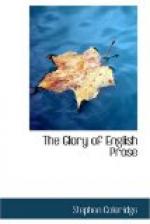The sound of church bells, being entirely the creation of man, forms perhaps a more touching link with the past for us than the eternal sounds of nature. Yet the everlasting wash of the waves of the sea forms a bond between us and the unplumbed depths of time, as they
“Begin and cease, and then again
begin
With tremulous cadence slow, and bring,
The eternal note of sadness in.
Sophocles long ago
Heard it on the AEgean, and it brought
Into his mind the turbid ebb and flow
Of human misery.”
So wrote Matthew Arnold. Then there is the sound of wind in the trees, and the voice of falling waters and rippling streams which must have fallen upon the ears of our remotest fore-runners as they do upon our own. These eternal sounds about us take no note of our brief coming and going, and will be the same when you and I, Antony, and all the millions that come after us in the world have returned to dust.
Your loving old
G.P.
30
MY DEAR ANTONY,
Though I do not myself rank Matthew Arnold among the great prose writers of England, yet, like all true poets—and he indeed was one of them,—he wrote excellent English prose.
It is true that he turned to poetry to express his finest emotions and thoughts, and he himself alludes to his prose writings thus: “I am a mere solitary wanderer in search of the light, and I talk an artless, unstudied, everyday familiar language. But, after all, this is the language of the mass of the world.”
The chief note of all his teaching was urbanity. “The pursuit of perfection,” he said, “is the pursuit of sweetness and light.” “Culture hates hatred: culture has one great passion—the passion for sweetness and light.”
This teaching, no doubt, leads to fields of pleasantness and charm, and not at all to the high places of self-sacrifice, or the austere peaks of martyrdom. Burning indignation against intolerable things, fierce denunciation of the cruelties and abominations of the world find no encouragement or sympathy from this serene, detached, and therefore somewhat ineffectual, teaching.
Sweetness and light would never have interfered with the slave trade, or fiercely fought beside Plimsoll for the load-line on the sides of ships.




